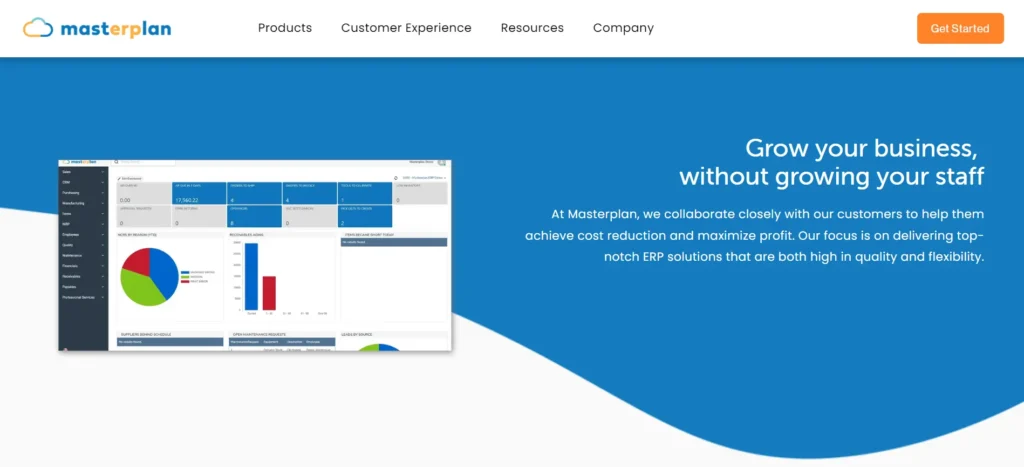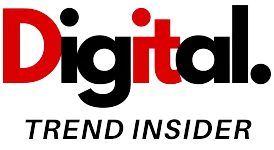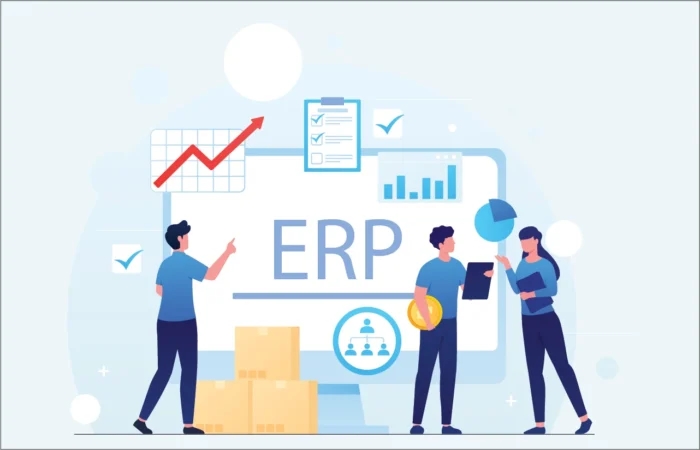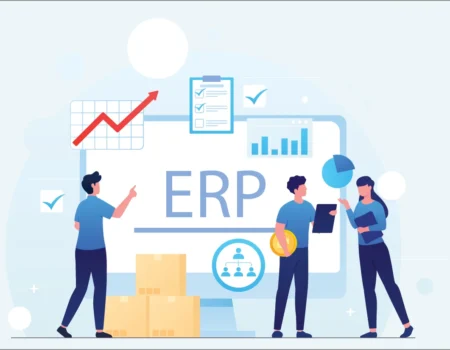Table of Contents
In today’s fast-paced and competitive business environment, efficient business management software is essential for success. Enterprise Resource Planning (ERP) systems have emerged as crucial tools for integrating and managing core business processes. By providing a unified view of operations, ERP systems enable businesses to optimize workflows, improve data accuracy, and make informed decisions.
According to the report published by Allied Market Research, the global ERP software market accounted for $35.81 billion in 2018 and is anticipated to reach $78.41 billion by 2026, growing at a CAGR of 10.2% during the study period.
ERP systems streamline various functions, such as financial management, inventory control, order management, and customer relationship management (CRM). They help businesses reduce operational costs, increase productivity, and enhance efficiency.
Implementing an ERP system can significantly improve key performance indicators (KPIs), such as order fulfillment rates, inventory turnover, and customer satisfaction.
In this review, we will provide a detailed analysis of Masterplan ERP, covering its features, pricing, pros and cons, user feedback, and comparisons with competitors.
Masterplan ERP reviews guide will help businesses determine whether Masterplan ERP is the right solution for their needs.
What is Masterplan ERP?
Masterplan ERP is an enterprise resource planning solution designed to streamline and integrate various business processes. Its modular architecture allows businesses to customize the system to fit their specific needs, making it an ideal choice for small to mid-sized companies seeking scalable and flexible solutions.
The system offers a wide range of functionalities, including financial management, inventory control, order management, manufacturing execution, and customer relationship management.
Masterplan ERP’s primary target audience includes businesses looking for a robust and cost-effective ERP solution. The system is particularly beneficial for companies that need to enhance their operational efficiency, improve data accuracy, and make informed decisions.
By offering a unified view of operations, Masterplan ERP enables businesses to optimize workflows, reduce operational costs, and increase productivity.
Key Industries Served
Masterplan ERP is versatile and serves a broad spectrum of industries. Its feature set is tailored to meet the unique needs of various sectors, including:
- Manufacturing: Masterplan ERP helps manufacturers manage production processes, track work orders, and ensure product traceability.
- Distribution: The system optimizes supply chain management, inventory control, and order fulfillment processes.
- Retail: Retail businesses benefit from enhanced inventory management, sales tracking, and customer relationship management.
- Professional Services: Service-oriented companies can manage projects, track time and expenses, and streamline billing processes.
- Healthcare: Masterplan ERP supports healthcare providers with patient management, billing, and regulatory compliance.
- Food and Beverage: The system ensures quality control, traceability, and compliance with industry standards.
Key Features of Masterplan ERP Solutions

Masterplan ERP is a comprehensive enterprise resource planning solution designed to streamline various business operations. Its robust features cater to the needs of accounting, order management, inventory control, manufacturing, and more, making it an ideal choice for businesses seeking efficiency and growth. Let’s explore each in detail.
1) Accounting and Financial Management
Masterplan ERP excels in accounting and financial management, providing businesses with comprehensive tools to manage their financial operations. The system includes a general ledger, accounts payable and receivable, fixed assets management, and financial reporting.
These features ensure accurate financial tracking and compliance with regulatory standards. Users can generate real-time financial reports, track expenses, and manage budgets efficiently, helping businesses maintain financial health and transparency.
2) Order Management and Procurement
The order management and procurement module of Masterplan ERP streamlines the entire order-to-cash process. This feature includes order entry, pricing, promotions, and procurement functionalities. It ensures efficient order processing and supplier management by automating key tasks and reducing manual errors.
Businesses can manage purchase orders, track supplier performance, and optimize procurement strategies to improve cost efficiency and operational effectiveness.
3) Inventory and Warehouse Management
With Masterplan ERP’s inventory and warehouse management capabilities, businesses can maintain optimal inventory levels, track stock movements, and manage multiple warehouses. This module supports real-time inventory visibility and helps reduce carrying costs by providing accurate insights into inventory levels and movements.
The system facilitates warehouse operations, including picking, packing, and shipping, ensuring efficient management of inventory and warehouse resources.
4) Manufacturing Execution and Traceability
The manufacturing execution and traceability features of Masterplan ERP help manage production processes from planning and scheduling to execution and monitoring. This module includes tools for tracking production costs, managing work orders, and ensuring product traceability.
Businesses can monitor production activities in real time, optimize manufacturing workflows, and ensure compliance with industry standards. This enhances production efficiency and product quality.
5) Supply Chain Planning and Management
Masterplan ERP’s supply chain planning and management capabilities optimize the flow of goods and materials, ensuring timely delivery and reduced lead times. This module supports demand forecasting, supply planning, and logistics management.
Businesses can enhance their supply chain visibility, improve supplier collaboration, and reduce operational costs by effectively managing supply chain activities from procurement to delivery.
6) Quality Control and Assurance
The quality control and assurance module ensures that products meet quality standards through rigorous inspection and testing processes. It helps businesses identify defects early, reduce rework, and ensure customer satisfaction.
The system supports quality audits, compliance management, and continuous improvement initiatives, helping businesses maintain high-quality standards and regulatory compliance.
7) Business Intelligence and Reporting
Masterplan ERP provides powerful business intelligence and reporting tools that enable data-driven decision-making. The system includes customizable dashboards, real-time analytics, and comprehensive reporting capabilities.
Businesses can generate detailed reports, monitor key performance indicators (KPIs), and gain actionable insights to drive strategic decisions. This enhances overall business performance and competitive advantage.
8) Customer Relationship Management (CRM)
The integrated customer relationship management (CRM) system helps businesses manage customer interactions, sales processes, and service delivery. This feature includes contact management, sales pipeline tracking, and customer service tools. Businesses can enhance customer relationships, improve sales performance, and deliver exceptional customer service by leveraging CRM capabilities within Masterplan ERP.
9) Mobile Capabilities and User Accessibility
Masterplan ERP offers mobile capabilities and user accessibility, allowing users to access the system from anywhere, at any time. This feature supports remote work and enhances user productivity by providing on-the-go access to critical business information. The system is designed to be user-friendly, with intuitive interfaces and mobile applications that ensure seamless access to ERP functionalities on various devices.
Masterplan ERP’s rich feature set empowers businesses to streamline operations, enhance efficiency, and achieve greater success. By leveraging these capabilities, businesses can optimize their workflows, improve data accuracy, and make informed decisions that drive growth and profitability.
Pricing and Implementation of Masterplan ERP
Understanding the pricing model and costs associated with Masterplan ERP is crucial for businesses considering this solution.
Masterplan ERP offers a flexible pricing structure that typically includes either a one-time license fee or a subscription-based model. The subscription model is often preferred as it spreads costs over time, making it more manageable for small to mid-sized businesses.
The pricing is generally based on several factors:
- Number of users: The cost increases with the number of users accessing the system.
- Modules selected: Businesses can choose specific modules that suit their needs, affecting the overall cost.
- Customization requirements: Tailoring the system to meet unique business needs can incur additional costs.
Masterplan ERP is known for its competitive pricing, making it an attractive option for businesses seeking a cost-effective ERP solution without compromising on features and capabilities.
Implementation Process and Challenges
The implementation process for Masterplan ERP involves several stages, each requiring careful planning and execution. The steps in the implementation process include:
- Establishing project goals, timelines, and resource allocation.
- Setting up the system according to business requirements, including module selection and customization.
- Transferring data from legacy systems to Masterplan ERP, ensuring data accuracy and integrity.
- Providing training to users to ensure they can effectively utilize the system.
- Launching the system for full-scale operations, with ongoing support to address any issues.
While the implementation process can bring significant benefits, it also comes with challenges. Common challenges include:
- The initial setup requires time and effort, particularly for complex businesses.
- Ensuring data accuracy and completeness during migration can be challenging.
- Users may face a learning curve, requiring effective training and change management strategies.
Despite these challenges, proper planning, support from the Masterplan ERP team, and a phased implementation approach can mitigate risks and ensure a successful rollout.
Additional Costs
In addition to the base pricing, businesses should be aware of potential additional costs associated with Masterplan ERP implementation and ongoing use. These costs can include:
- Customization fees: Tailoring the system to meet specific business needs may involve additional charges.
- Training expenses: Providing thorough training to users can incur costs, especially if external trainers are involved.
- Support and maintenance: Ongoing support and maintenance services, including software updates and technical assistance, may require a separate fee.
- Integration costs: Connecting Masterplan ERP with other business systems or third-party applications may involve additional expenses.
- Hardware and infrastructure: Upgrading existing hardware or infrastructure to support the new ERP system can also contribute to overall costs.
By considering these additional costs, businesses can budget more effectively and ensure they have the necessary resources to maximize the value of their Masterplan ERP investment.
Pros and Cons of Masterplan ERP
| Pros | Cons |
|---|---|
| Competitive Pricing: Affordable for small to mid-sized businesses with flexible pricing options (one-time license fees or subscription-based). | Initial Setup Can Be Time-Consuming: Involves several stages (planning, configuration, data migration, training) and can be resource-intensive. |
| Comprehensive Feature Set: Covers financial management, inventory control, order management, CRM, and includes business intelligence and reporting for data-driven decisions. | Steep Learning Curve: Extensive feature set and advanced functionalities require substantial training and adjustment time. |
| Scalable and Flexible: Suitable for various sizes and industries; easy to add new modules or expand functionalities as needs evolve. | Mixed Reviews on Ease of Use and Customer Service: Some users find the interface less intuitive and have varied experiences with customer service |
| Strong Customer Support Resources: Includes extensive training, documentation, and technical assistance, helping maximize ERP investment. | Customization Can Be Costly: Tailoring the system to specific business needs can incur additional costs. |
User Reviews and Feedback
In Masterplan ERP reviews, user reviews and feedback provide valuable insights into the real-world performance of Masterplan ERP. Overall, the system has received positive feedback for its robust features, scalability, and affordability. However, opinions on ease of use and customer service are mixed.
General User Sentiment from Multiple Sources
The general sentiment among users is that Masterplan ERP effectively streamlines business processes and enhances operational efficiency.
Users appreciate the system’s ability to integrate various functions, providing a unified view of operations and facilitating better decision-making. The affordability of Masterplan ERP is also a significant advantage for many small to mid-sized businesses.
Positive Feedback Highlights
- Users have noted significant improvements in efficiency and productivity after implementing Masterplan ERP.
- The robust financial management tools are praised for their accuracy and compliance with regulatory standards.
- Businesses appreciate the system’s ability to scale with their needs, accommodating growth and increased complexity.
Common Criticisms
- Some users have reported that the implementation process took longer than expected, requiring substantial planning and resources.
- The system’s interface has been described as less intuitive, making it challenging for new users to navigate and utilize effectively.
- While some users have had positive interactions with customer support, others have experienced delays and varying levels of service quality.
By considering both the pros and cons of Masterplan ERP, businesses can make a more informed decision about whether this ERP solution aligns with their needs and goals.
Case Studies of Businesses Successfully Using Masterplan ERP
Examining real-world applications of Masterplan ERP provides valuable insights into its impact on businesses. Several companies across various industries have successfully implemented Masterplan ERP, experiencing significant operational improvements.
Example 1: Mid-Sized Manufacturing Company A mid-sized manufacturing company implemented Masterplan ERP to manage its production processes, track work orders, and ensure product traceability. The company reported a 30% reduction in production lead times and a 20% increase in inventory accuracy, resulting in improved efficiency and cost savings.
Example 2: Retail Business A retail business utilized Masterplan ERP to enhance its inventory management, sales tracking, and customer relationship management. The system helped the company optimize stock levels, reduce stockouts, and improve customer service, leading to a 25% increase in sales within the first year of implementation.
Benefits Experienced by the Businesses
- Businesses experienced improved data accuracy and real-time visibility into their operations, enabling better decision-making and strategic planning.
- The automation of routine tasks and integration of various business functions streamlined operations, reducing manual work and increasing productivity.
- With access to comprehensive business intelligence and reporting tools, companies could make data-driven decisions that positively impact their performance and growth.
Comparison with Other Leading ERP Solutions
Several factors stand out when comparing Masterplan ERP to other leading ERP solutions such as SAP, Oracle, and Microsoft Dynamics. Masterplan ERP offers a more affordable and scalable solution, particularly suited for small to mid-sized businesses. In contrast, larger enterprises often favor SAP and Oracle due to their extensive features and advanced capabilities.
Unique Selling Points of Masterplan ERP
- Masterplan ERP’s competitive pricing makes it an attractive option for businesses looking to implement a robust ERP system without significant financial strain.
- The system provides a wide range of functionalities, covering all critical aspects of business management, from financial management to inventory control and CRM.
- Masterplan ERP is known for its strong customer support resources, ensuring businesses receive the necessary assistance during and after implementation.
Areas Where Competitors Might Have an Edge
- Competitors like SAP and Oracle offer more advanced analytics and artificial intelligence (AI) capabilities, which can be beneficial for businesses requiring sophisticated data analysis and automation.
- Systems like Microsoft Dynamics have a larger ecosystem of third-party integrations, providing businesses with more options to extend and customize their ERP functionalities.
- SAP, Oracle, and Microsoft Dynamics have established themselves as industry leaders, with a longer track record and more extensive user base, which can be a decisive factor for some businesses.
By understanding these comparisons, businesses can better evaluate the strengths and weaknesses of Masterplan ERP relative to its competitors and make an informed decision about which ERP solution best meets their needs.
FAQs on Masterplan ERP Reviews
Q1. How does Masterplan ERP handle software updates and upgrades?
Masterplan ERP provides regular updates that are managed through their cloud-based system. These updates aim to improve system functionalities and security features, ensuring that businesses are always equipped with the latest tools and compliance standards.
Q2. Can Masterplan ERP be customized to fit industry-specific needs?
Yes, Masterplan ERP can be tailored to meet the specific needs of various industries. This customization allows businesses to enhance their operational efficiency by adapting the ERP system to their unique processes and requirements.
Q3. What are the security protocols for Masterplan ERP to protect business data?
Masterplan ERP includes robust security measures such as data encryption and secure user authentication. These protocols help safeguard sensitive business information against unauthorized access and data breaches.
Q4. What kind of training and support does Masterplan ERP offer to new users?
Masterplan ERP offers various training resources including documentation, in-person sessions, and live online training. They also have a dedicated support team available to assist with any technical questions or issues that may arise.
Conclusion
In summary of Masterplan ERP review guide, I can say that, Masterplan ERP is a scalable, affordable ERP solution that caters to the needs of modern businesses. Its feature set, including financial management, inventory control, order management, manufacturing execution, supply chain planning, quality control, business intelligence, and CRM, makes it a valuable tool for optimizing operations and driving efficiency.
Masterplan ERP’s competitive pricing, capabilities, and strong customer support resources make it an attractive option for small to mid-sized businesses. Despite some challenges, such as a lengthy implementation process and a steep learning curve, the system’s benefits far outweigh its drawbacks. The positive feedback from users and the successful case studies highlight the significant improvements businesses can achieve with Masterplan ERP.
Recommendation Based on Different Business Needs
For small to mid-sized businesses looking for an affordable yet comprehensive ERP solution, Masterplan ERP is highly recommended. Its scalability and flexibility make it suitable for growing companies, while its robust feature set ensures that all critical business functions are effectively managed.
Businesses in industries such as manufacturing, distribution, retail, professional services, healthcare, and food and beverage can particularly benefit from Masterplan ERP’s custom capabilities.







No Comment! Be the first one.